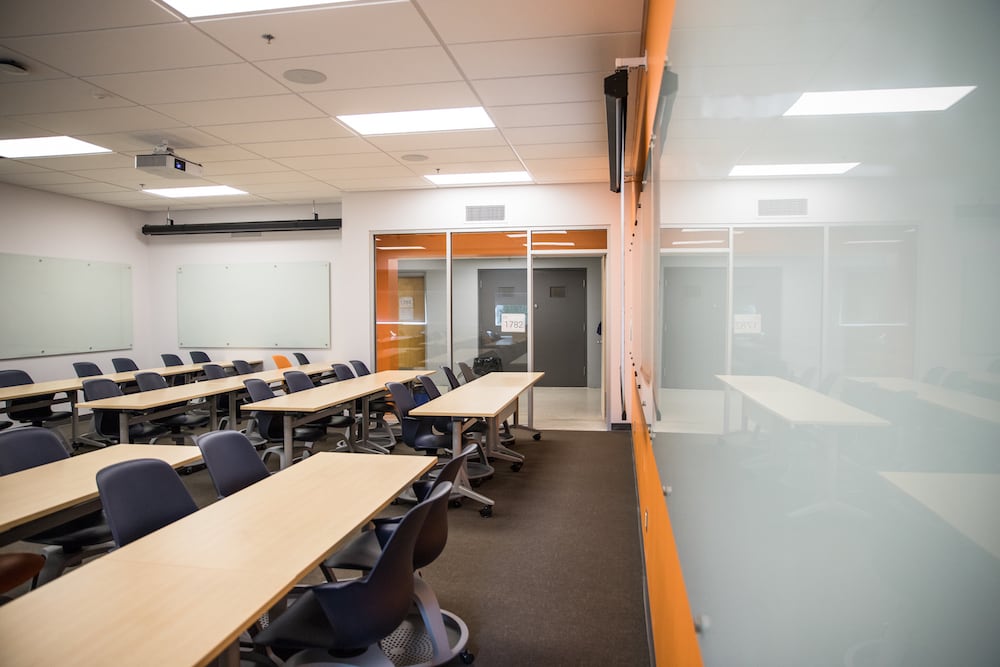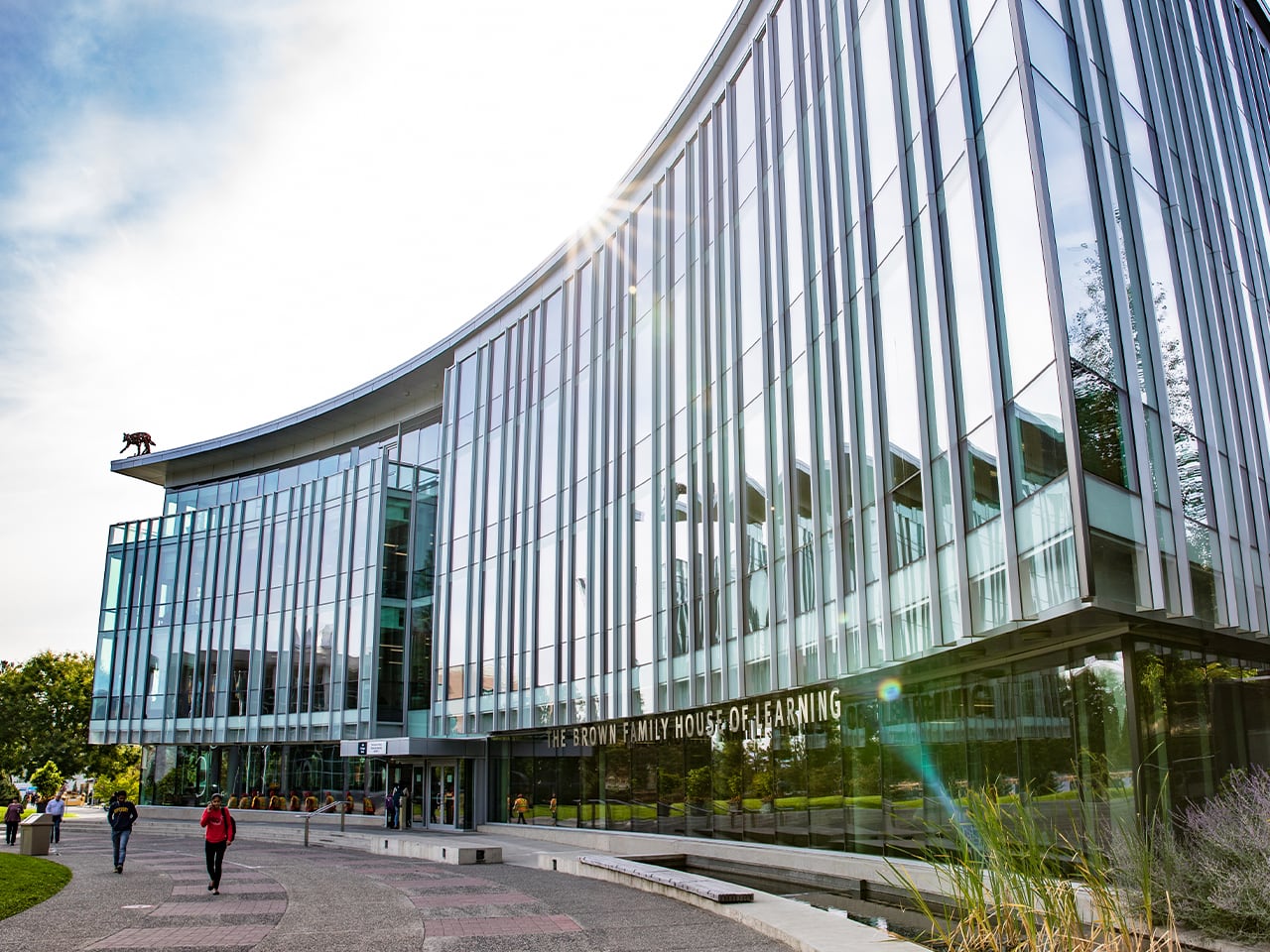Hone your critical thinking and communication skills with an in-demand degree.
Focus on the study and analysis of literature, both contemporary and classical. Sharpen your writing, composition, and public speaking abilities. With your passion for the written word, and curiosity of humanity’s vast literary expression, deepen your own understanding of the English language. An English major is among the most popular and well–established pathways through higher education.
Immerse yourself in the words of past poets or present-day thinkers. With every new page, imagine and reflect on lives different from your own, and challenge your assumptions from new and unexpected perspectives.
In a curriculum that spans time and traverses the globe, you will study literary conventions, genres, traditions, and the functions of literature in many forms, which could include Indigenous knowledge and ways.
Why pursue a Bachelor of Arts, English Major?
An English degree could be your passport to a career as an writer, editor, journalist, educator or any number of exciting occupations that bank on your use of the written and spoken word. In fact, professions that require these skills can cover a lot of ground. The competence you’ll gain will apply in a wide range of business, educational and professional settings.
Expansive Choice
The study of literature—including stories, films, poems, graphic novels and digital content—animates our experience of diverse cultures, identities and time periods. You’ll graduate with superior writing proficiency, ready to enhance the cultural landscape and advance the art of communication in various forms and industries.

What will I learn?
Develop a cultural vocabulary that considers the human condition through philosophy, history and many literary modes from satire to tragedy. As a literature student, you'll hone your abilities as a critical reader, writer and thinker.
Communicate in writing with clarity and precision in an articulate, coherent, and grammatically-correct style for an intended audience. Read texts closely to illustrate knowledge of stylistic features, themes, rhetorical elements, and to make informed critical comparisons of these elements within a variety of literary works.
Apply a variety of theoretical and critical approaches to literary analysis, and recognize the interdisciplinary connections between English literature and other academic fields. Compose and assess written works creatively and critically in a variety of forms. Interrogate the ways in which ethical assumptions are shaped, and analyze how ethical frameworks affect readings of texts.
-
94% of graduates said that said the quality of instruction was very good or good
-
88% of employed graduate respondents were working full-time
-
79% of employed respondents were in a job related to their program
-
45% took further studies
Taken from BC Student Outcomes Data (Data from 2018 to 2020)
Program requirements
Lower Level English Requirements (15.00 Credits)
Students majoring in English are required to complete 6 credits of 1000-level English courses, as specified, in addition to completing 9 credits of 2000-level English courses, as specified.
Note: ENGL 2120 is strongly recommended.
- To fulfill the program requirements for the Major in English, students will complete 45 English credits. Of the 45 credits, students will complete 15 credits at the lower-level, comprising 6 credits of 1000-level courses and 9 credits of 2000-level courses. Students are required to choose 6 credits from the following 1000-level courses
- ENGL1100-Introduction to University Writing (3) or
- ENGL1110-Critical Reading and Writing (3) or
- ENGL1120-Introduction to Poetry (3) or
- ENGL1140-Introduction to Drama (3) or
- ENGL1210-Introduction To Drama & Poetry (3)
- In addition to choosing 6 English credits at the 2000-level, students must complete 3 credits as follows:
- ENGL2110-Literary Landmarks in English to 1700 (3)
- At the 2000-level, English Majors are strongly advised to complete ENGL 2120. Only 3 credits of the following can be used towards fulfillment of the second-year requirements: ENGL 2010, 2020, 2060, 2070, or 2080. (6)
Upper Level English Requirements (30.00 Credits)
Students majoring in English will complete a minimum of 30 credits of English courses at the 3000 and 4000 levels, including the capstone course, ENGL 4760.
NOTE EXCEPTIONS:
- A maximum of 3 credits of Creative Writing is allowed.
- A maximum of 6 credits of Service Learning may be applied to the Major in English.
- A maximum of 3 credits can be applied from: PHIL3750 and JOUR4310.
Students who are considering going on to graduate school are advised to consult with an English Advisor for guidance on the best selection of courses for acceptance into university graduate programs.
Degree/Graduation Requirements.
The major must be completed with a total of 45 credits in English as described in the curriculum information. Students completing this major must also meet the University's general education requirements, including the completion of the capstone course, ENGL 4760, which must be taken in the final 30 credits of study.
Admission requirements
- Grade 12 (or equivalent) or mature student status
- English Studies 12/English First Peoples 12 with a minimum of 73% (or equivalent)
Admission to each major program may have specific requirements.
Career Options / Laddering options
Majoring in English is exceptional preparation for just about any profession. Graduates pursue the following careers:
- Writer
- Journalist
- Author
- Editor
- Marketing Manager
- Public Relations Manager
- Technical Writer
- Publisher
- Fundraiser
- Publications Specialist
- Researcher
- Sign Language Interpreter
- Television and Radio Reporter
- Film, Television, or Journalism Broadcaster
- Copy Writer / Editor
- Lawyer
- Teacher
- Professor
- Librarian
You can also leverage your solid research, critical thinking and writing skills acquired as part of your degree into other careers. Graduates find added pathways in education, tourism, publishing, market research, logistics and more.
Laddering options
Graduate Certificate in Online Teaching and Learning

“Jan Duerden has always inspired me from the first class I ever had with her. What's really interesting is that she gives a great structure for what she wants, but unlike most professors she lets students have a lot of freedom to study and research things that they are truly passionate about. She always makes herself available to her students and offers as much help as you're willing to ask for, which provides us with the optimum success rate.”
—Paige Elizabeth Caswell, Bachelor of Arts graduate

“TRU is a very accessible place, I’m so thankful because this whole experience has been about ‘us‘, not just ‘me‘ or just ‘you.’ Faculty and staff sometimes ask me what can be done to improve my experience, but honestly, everything is perfect.”
—Paul Millross (visually impaired English alum)

“The countless faculty members who invested their time to get to know me on an individual level will always leave a lasting impression on me as I continue into my career. You will find success but most importantly you will find people who will encourage that success from the beginning.”
—Hana Kotani, English student

“What I like most about TRU is that every single one of my professors have treated me like a person and not as a number. All of the university staff I’ve met have also been really supportive in my educational journey! TRU is awesome, it’s truly a place of learning where professors are actually happy if you go to their office and each lecture is totally worth your time!
Dr. George M. Johnson has been pivotal to my development as a writer and he is my favourite professor!”
—Emi Ohama, Bachelor of Arts student in the English and Creative Writing Programs
Gatecrasher “a tiny miracle” for Buis
Susan Buis has lived in the Southern Interior for almost 14 years and admits that after a somewhat nomadic life, she struggled to open herself to this place. But she has established roots now, and her clear connections to the land are evident throughout Gatecrasher, which was published in the spring of 2019. While Buis’ work has appeared in many publications, including The Fiddlehead and Prairie Fire, this is her first book of poetry, and is something she refers to as “a tiny miracle.”
Hofmann wins UBC Okanagan’s short story contest
English faculty member Karen Hofmann took first place for her short story “The Island.” UBC Writer in Residence Renée Sarojini Saklikar unveiled the winners of the 2017 Okanagan Short Story Contest Tuesday night in the Great Room at the Kelowna branch of the Okanagan Regional Library.
“Being able to share my love of literature with students and learn from those students is the most rewarding aspect of teaching for me.” —Thomas Friedman, English & Modern Languages Faculty
Program Details
- Credential
- Bachelor of Arts, Major in English
- Delivery
- Kamloops
- Length
- Four years
- Intake dates
- September, January, May
- Applications
- Now accepting applications
- International
- Open to international applicants



